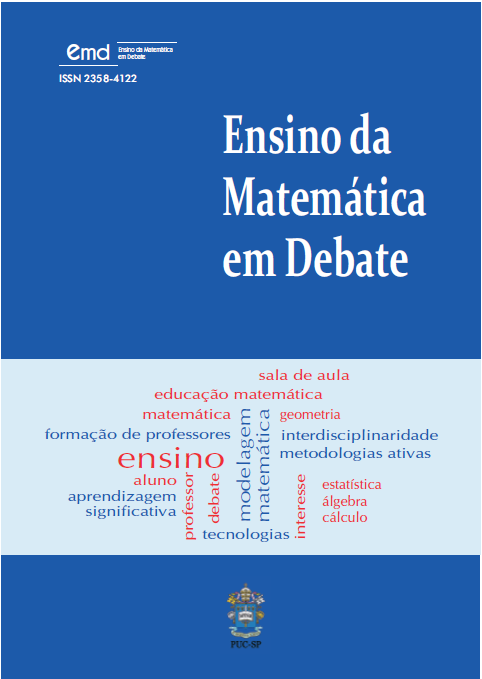Ensino-Aprendizagem de Matemática via Resolução de Problemas: reflexões sob o enfoque da aprendizagem significativa crítica
Palavras-chave:
Aprendizagem Subversiva, Solução de problemas, Teoria de Ensino, David AusubelResumo
Partindo do pressuposto que é essencial que professores de Matemática busquem subsídios para fundamentar seu processo de ensino e aprendizagem, este estudo tem como objetivo evidenciar os princípios da Aprendizagem Significativa Crítica que podem ser favorecidos no Ensino-Aprendizagem de Matemática via Resolução de Problemas (EAMvRP). Por meio de um estudo teórico descritivo, buscamos analisar as cinco ações de Proença (2018) à luz dos 11 princípios de Moreira (2010). Percebemos que a principal relação se encontra em trabalhar os conhecimentos prévios dos alunos, a partir de uma situação de matemática dada, para buscar promover uma articulação, voltada à construção do conteúdo/conceito/assunto que se deseja ensinar. Neste processo de ensino da Matemática, identificamos que todos os princípios da Aprendizagem Significativa Crítica são valorizados pelo EAMvRP. Acreditamos que as relações por nós identificadas fornecem subsídios para fundamentar um trabalho em sala de aula que se baseie no Ensino-Aprendizagem de Matemática via Resolução de problemas.
Referências
AUSUBEL, David Paul. The psychology of meaningful verbal learning. 1. ed. New York: Grune e Stratton, 1963.
AUSUBEL, David Paul. Aquisição e Retenção de Conhecimentos: uma perspectiva cognitiva. 1. ed. New York: Kluwer Academic Publishers, 2002. 243 p. Tradução Lígia Teopisto.
AUSUBEL, David Paul; NOVAK, Joseph. D.; HANESIAN, Helen. Educational psychology: a cognitive view. 2. ed. New York: Holt Rinehart e Winston, 1978.
BARROS, Aidil Jesus Paes; LEHFELD, Neide Aparecida de Souza. Fundamentos de Metodologia: um guia para a iniciação científica. 2. ed. São Paulo: Makron Books, 2000.
CHIRONE, Adriana Regina da Rocha; MOREIRA, Marco Antonio; SAHELICES, Concesa Caballero. Aprendizagem significativa crítica no ensino dos números e seus conjuntos. Revista Dynamis, [S.l.], v. 27, n. 2, p. 03-19, set. 2021.
GIL. Antonio Carlos. Métodos e técnicas de pesquisa social. 5. ed. São Paulo: Atlas, 2007.
MAYER, Richard Edward. Implications of cognitive psychology for instruction in mathematical problem solving. IN: SILVER, E. A. (Ed.) Teaching and learning mathematical problem solving: multiple research perspective. Hillsdale: LEA, 1985. p. 123-138.
MENDES, Luiz Otavio Rodrigues.; PROENÇA, Marcelo Carlos de. O Ensino de Matemática via resolução de problemas na formação inicial de professores. Revista de Educação Matemática, São Paulo: v. 17, p. 01-24, 2020.
MOREIRA, Marco Antonio. Aprendizagem Significativa Crítica. Porto Alegre: Instituto de Física, 2005. Publicada também em Indivisa, Boletín de Estúdios e Investigación, n°6, p. 83-101, 2005, com o título Aprendizaje Significativo Crítico 2ª edição, 2010.
MOREIRA, Marco Antonio. Aprendizagem Significativa: a teoria e textos complementares. 1. ed. São Paulo: Livraria da Física, 2011.
MOREIRA, Marco Antonio. O que é afinal, aprendizagem significativa? Qurriculum, Laguna: v. 2, n. 3, p. 1-27, 2012.
MOREIRA, Marco Antonio. Teorias de Aprendizagem. 2. ed. São Paulo: Editora Pedagógica e Universitária, 2017.
MIZUKAMI, Maria da Graça Nicoletti. Ensino: as abordagens do processo. 1. ed. São Paulo: EPU, 1986.
ONUCHIC, Lourdes de la Rosa.; ALLEVATO, Norma Suely. Gomes. Pesquisa em resolução de problemas: caminhos, avanços e novas perspectivas. Boletim de Educação Matemática, São Paulo, v. 25, n. 41, p. 73-98, 2011.
PROENÇA, Marcelo Carlos de. Resolução de problemas: encaminhamentos para o ensino e a aprendizagem de Matemática em sala de aula. 1. ed. Maringá: Eduem, 2018.
SEIXAS, Geovânia dos Santos; SANTAROSA, Maria Cecília Pereira; FERRÃO, Naíma Soltau. Educação Financeira na EJA: proposta de uma sequência didática à luz da Teoria da Aprendizagem Significativa Crítica. Research, Society and Development, v. 9, n. 11, p. 1-24, 2020.
Downloads
Publicado
Como Citar
Edição
Seção
Licença
Copyright (c) 2022 Ensino da Matemática em Debate

Este trabalho está licenciado sob uma licença Creative Commons Attribution-NonCommercial 4.0 International License.

Este obra está licenciado com uma Licença Creative Commons Atribuição 4.0 Internacional.





